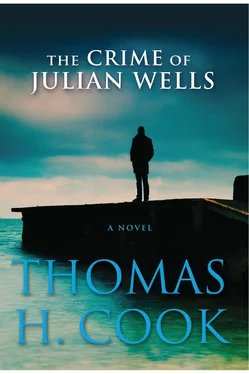Thomas Cook - The Crime of Julian Wells
Здесь есть возможность читать онлайн «Thomas Cook - The Crime of Julian Wells» весь текст электронной книги совершенно бесплатно (целиком полную версию без сокращений). В некоторых случаях можно слушать аудио, скачать через торрент в формате fb2 и присутствует краткое содержание. Год выпуска: 2012, ISBN: 2012, Издательство: Grove Press, Жанр: Криминальный детектив, на английском языке. Описание произведения, (предисловие) а так же отзывы посетителей доступны на портале библиотеки ЛибКат.
- Название:The Crime of Julian Wells
- Автор:
- Издательство:Grove Press
- Жанр:
- Год:2012
- ISBN:9780802194589
- Рейтинг книги:5 / 5. Голосов: 1
-
Избранное:Добавить в избранное
- Отзывы:
-
Ваша оценка:
- 100
- 1
- 2
- 3
- 4
- 5
The Crime of Julian Wells: краткое содержание, описание и аннотация
Предлагаем к чтению аннотацию, описание, краткое содержание или предисловие (зависит от того, что написал сам автор книги «The Crime of Julian Wells»). Если вы не нашли необходимую информацию о книге — напишите в комментариях, мы постараемся отыскать её.
The Crime of Julian Wells — читать онлайн бесплатно полную книгу (весь текст) целиком
Ниже представлен текст книги, разбитый по страницам. Система сохранения места последней прочитанной страницы, позволяет с удобством читать онлайн бесплатно книгу «The Crime of Julian Wells», без необходимости каждый раз заново искать на чём Вы остановились. Поставьте закладку, и сможете в любой момент перейти на страницу, на которой закончили чтение.
Интервал:
Закладка:
“That’s where Marisol was from,” I told him.
Hendricks nodded. “Yes. I saw that when I read the report.”
“What happened to Vargas?” I asked.
“He was shot eventually,” Hendricks answered. “It was quite clear that before he died, he’d been rather badly treated.”
“What does that mean?”
“That he’d been tortured for a long time,” Hendricks said. “Missing some important parts, if you know what I mean.” A smile slithered onto his face. “He deserved every cut, if you ask me.”
“Where was he found?”
“Floating in the Plata,” Hendricks answered.
“I can’t imagine Marisol having anything to do with a man like that,” I said.
“Then how do you explain the picture?” Hendricks asked. “I don’t know how Julian got that picture, but I do know this: Casa Rosada had come to suspect that Marisol was a spy for Vargas and that she was primarily trying to find information while working as a guide for the American consulate.”
I had briefly imagined Marisol in this cloak-and-dagger role, skulking in the shadows of the consulate, pressing her ears against a door or her eyes to a keyhole.
“Of course, that might only have been her cover,” Hendricks added.
He saw that I didn’t understand this.
“It’s called the double take,” Hendricks explained. “The agent allows herself to be revealed as a little, insignificant operative in order to conceal the fact that she is actually a very important one. So you have to look again. Hence, the double take.”
“But there’s no evidence that Marisol was. .” My question trailed off.
“No, but there was an intelligence report on her,” Hendricks answered. “It didn’t say a lot, but it didn’t have to, because what it says emphatically just by existing is that Marisol was a person of considerable interest to Casa Rosada.” He shrugged. “As I’m sure you know, Buenos Aires was a nest of vipers in those days. On both sides, people were being tortured, killed. For most people in the world, politics is not a game.”
There was more than a hint of condescension in Hendricks’s last remark, the implication that in Argentina Julian and I were playing hopscotch in a torture chamber.
Hendricks placed his briefcase on the table. “Was Julian political?” he asked.
“Political,” I repeated. “Do you mean was he an idealist, some kind of an ideologue?”
“Those two are very different,” Hendricks said.
“In what way?”
“An idealist is a man with blinders,” Hendricks answered. “An ideologue is a man who’s blind.” He looked at me gravely. “Which was Julian?”
“I’m not sure he was either one,” I said. “I don’t think he had time to be before. .”
“Before what?”
“Before Marisol disappeared,” I said. “And after that, as you know, he did nothing but look for her.”
Hendricks nodded. “Look for her, yes.”
Now his eyes gave off the sense of a man who’d seen too much and who regarded those who hadn’t as little more than children.
“Who did this friend of yours think he was, hmm?” he asked. “Some superhero? The type your father dreamed of being?” He looked at me as if the bloom of youth were still on my cheeks. “Grow up, please.”
He paused a moment, then leaned forward in a way that was decidedly avuncular.
“Do you know what real warriors say about a fictional creation like Rambo?” he asked. “That he would be dead in five minutes. But that during the course of those fateful five minutes, his bullshit heroics would kill every soul under his command.”
He watched me for a moment, like a man looking for a hidden motive; then he leaned forward and looked at me as though certain of one thing: that for all my privilege, all my expensive education, I could still stand another lesson.
“You cannot know a people if you do not share their pain,” he said, “and Julian knew nothing about what was going on in Argentina. He was just a tourist who happened to stick his toe into a river of blood.”
He drew an envelope from his briefcase.
“Be glad you’ve lived a cautious life, Philip,” he said. “Because the reckless die young.” The envelope slid toward me. “And they kill young, too.”
19
In literature, the unopened envelope occupies a privileged place. Most famous, perhaps, is the one Angel does not find in Tess of the d’Urbervilles, and the lack of its discovery causes a deeper tragedy to unfold.
As I began to read it, I couldn’t help wonder if a further tragedy might also unfold in the report Hendricks had given me.
It was seventeen pages long. It had originally been written in Spanish, but Hendricks had gone to the trouble of having it translated.
The first pages were dully biographical. They recounted the date and place of Marisol’s birth, the deaths of her parents, her subsequent border crossings from Argentina to Paraguay, and her final settlement at age six, now an orphan, in the charge of Father Rodrigo, whose parish “presided over various charitable affairs within the region of Gran Chaco.”
On page 3, Marisol arrives in Buenos Aires. She is fourteen years old, the recipient of a small scholarship at a Catholic academy, one arranged by Father Rodrigo “as a result of her intelligence and ambition.” Marisol continues in this school for the next four years, chalking up impressive grades and glowing testimonials from the nuns, who find her dutiful, obedient, and “quick to take advantage of any opportunity to please.” She studies English more assiduously than any other subject.
On page 9, Marisol graduates from the academy, then begins to take courses at a vocational school that focuses on various aspects of what the report calls “clothing.” While at the school, she focuses on design.
To support herself, Marisol takes several jobs, all of the sort traditionally opened to the penniless. For a time she is a waitress, but she also serves as an usher at the opera house and as a clerk in its gift shop. She works as a tour guide at one of the city’s art museums. While working at the museum, her proficiency in English is noticed, and she makes a little extra money by leading English-speaking tours.
Throughout this time in her life, Marisol continues to take courses at the vocational school. In this way, she is like hundreds of other young women in the city. But now, and for the first time, something ominous appears in the report: “Subject makes contact with the American consulate in Buenos Aires and is employed as a guide.”
I knew that it did not take much to fall under the eye of the junta, but Marisol’s work as a guide struck me as so unlikely to yield useful information that it would hardly have been worth it for them to keep track of her, much less bother to kidnap and “disappear” her. I found no evidence that she’d made any effort to cozy up to any particular person, some high civilian or military official she might seduce, and from whom, during an evening of sex-hazed pillow talk, she might garner a bit of useful intelligence. In fact, she had never even served as a guide to anyone who could have been remotely considered a conduit for vital information.
The final two pages of the report provided both a chronology that succinctly recorded the previous events and a complete list of the people to whom Marisol had been recommended by the consulate, along with their professions, and their reasons for being in Argentina. Almost all of them were businessmen or people connected in one form or another to cultural exchange. Among the people for whom Marisol had served as a guide, there were no military personnel listed, no diplomats, no high officials from any government. Instead, Marisol appeared to have spent most of her time escorting members of various religious organizations who moved in steady caravans through whatever region was perceived rich in desperate souls, along with low-level representatives from a few small charities. It was such modest figures who made up Marisol’s list of clients, hardly the sort that might interest a spy.
Читать дальшеИнтервал:
Закладка:
Похожие книги на «The Crime of Julian Wells»
Представляем Вашему вниманию похожие книги на «The Crime of Julian Wells» списком для выбора. Мы отобрали схожую по названию и смыслу литературу в надежде предоставить читателям больше вариантов отыскать новые, интересные, ещё непрочитанные произведения.
Обсуждение, отзывы о книге «The Crime of Julian Wells» и просто собственные мнения читателей. Оставьте ваши комментарии, напишите, что Вы думаете о произведении, его смысле или главных героях. Укажите что конкретно понравилось, а что нет, и почему Вы так считаете.












